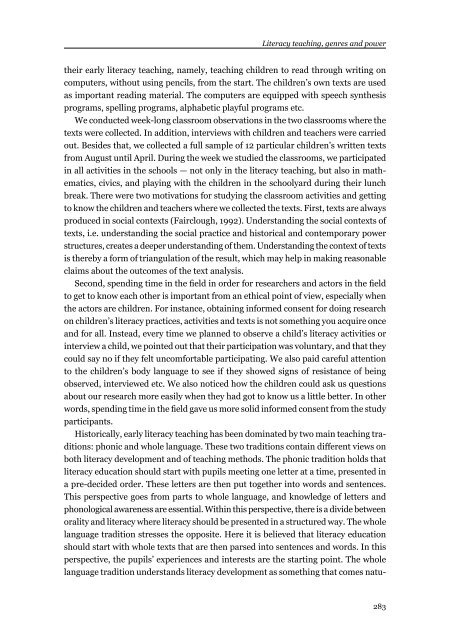Download issue - Umeå universitet
Download issue - Umeå universitet
Download issue - Umeå universitet
You also want an ePaper? Increase the reach of your titles
YUMPU automatically turns print PDFs into web optimized ePapers that Google loves.
Literacy teaching, genres and power<br />
their early literacy teaching, namely, teaching children to read through writing on<br />
computers, without using pencils, from the start. The children’s own texts are used<br />
as important reading material. The computers are equipped with speech synthesis<br />
programs, spelling programs, alphabetic playful programs etc.<br />
We conducted week-long classroom observations in the two classrooms where the<br />
texts were collected. In addition, interviews with children and teachers were carried<br />
out. Besides that, we collected a full sample of 12 particular children’s written texts<br />
from August until April. During the week we studied the classrooms, we participated<br />
in all activities in the schools — not only in the literacy teaching, but also in mathematics,<br />
civics, and playing with the children in the schoolyard during their lunch<br />
break. There were two motivations for studying the classroom activities and getting<br />
to know the children and teachers where we collected the texts. First, texts are always<br />
produced in social contexts (Fairclough, 1992). Understanding the social contexts of<br />
texts, i.e. understanding the social practice and historical and contemporary power<br />
structures, creates a deeper understanding of them. Understanding the context of texts<br />
is thereby a form of triangulation of the result, which may help in making reasonable<br />
claims about the outcomes of the text analysis.<br />
Second, spending time in the field in order for researchers and actors in the field<br />
to get to know each other is important from an ethical point of view, especially when<br />
the actors are children. For instance, obtaining informed consent for doing research<br />
on children’s literacy practices, activities and texts is not something you acquire once<br />
and for all. Instead, every time we planned to observe a child’s literacy activities or<br />
interview a child, we pointed out that their participation was voluntary, and that they<br />
could say no if they felt uncomfortable participating. We also paid careful attention<br />
to the children’s body language to see if they showed signs of resistance of being<br />
observed, interviewed etc. We also noticed how the children could ask us questions<br />
about our research more easily when they had got to know us a little better. In other<br />
words, spending time in the field gave us more solid informed consent from the study<br />
participants.<br />
Historically, early literacy teaching has been dominated by two main teaching traditions:<br />
phonic and whole language. These two traditions contain different views on<br />
both literacy development and of teaching methods. The phonic tradition holds that<br />
literacy education should start with pupils meeting one letter at a time, presented in<br />
a pre-decided order. These letters are then put together into words and sentences.<br />
This perspective goes from parts to whole language, and knowledge of letters and<br />
phonological awareness are essential. Within this perspective, there is a divide between<br />
orality and literacy where literacy should be presented in a structured way. The whole<br />
language tradition stresses the opposite. Here it is believed that literacy education<br />
should start with whole texts that are then parsed into sentences and words. In this<br />
perspective, the pupils’ experiences and interests are the starting point. The whole<br />
language tradition understands literacy development as something that comes natu-<br />
283

















